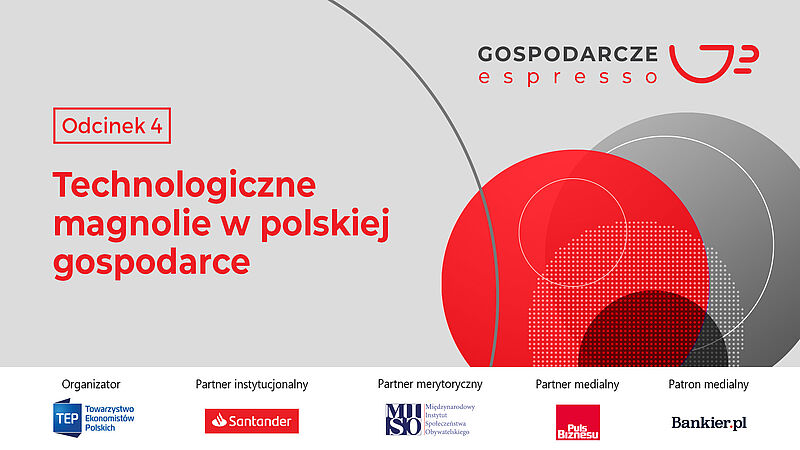Technological Magnolias in the Polish Economy - Economic Espresso
The meeting was attended by the speakers: Dominika Bettman (director general of Microsoft Poland), Andrzej Halesiak (economist, member of the Society of Polish Economists), Iwona Karasek-Wojciechowicz Ph.D (partner at Karasek & Wejman law firm, Department of Civil Law at Jagiellonian University, member of the Society of Polish Economists), Adam Ocharski (leader of Business Intelligence Area at Santander Bank Poland), Dr. Małgorzata Starczewska-Krzysztoszek (economist, lecturer at the Faculty of Economic Sciences of the University of Warsaw, member of the Society of Polish Economists). The meeting was chaired by Łukasz Korycki, deputy editor-in-chief of “Puls Biznesu”.
Economic Espresso is a project that provides a platform for a lively, substantive discussion and exchange of experiences and views on the current condition of the Polish economy and the most important socio-economic events.
In the fourth episode of the series, experts discussed opportunities and challenges of technological transformation facing the Polish economy and society, as well as the future of innovative solutions, including AI applications.
- Let's look at the European innovation ranking. Out of 27 EU countries, we are ranked 4th from the bottom. We are followed by Lithuania, Bulgaria and Romania. To some extent, this is an answer to whether we are succeeding in implementing new technologies and innovation projects - Dr. Małgorzata Starczewska-Krzysztoszek said.
- There has been a complete change in our shopping patterns.There have emerged solutions to support online buying, e.g. possibility to get an online loan. This is also followed by technological solutions in the area of services, such as remote hairdresser or beautician appointments, prescriptions coming via SMS or email. New technologies are penetrating every sphere of our lives today - Andrzej Halesiak said.
- Our boundary is blurring between where a bank begins and where a provider of e.g. appliances or services, does. I think that sooner or later this should be regulated or clarified in some way. On the other hand, banks will certainly seek to provide customers with the safest and most convenient access to their services - Adam Ocharski added.
- Digital transformation boomed overnight because of the pandemic and is speeding on. It requires leaders to take a completely new approach to leadership. This is primarily due to the complexity of the phenomenon of digital transformation, because it touches every aspect of life. It is not just about introducing more digital tools into office work or production processes. In addition to these technical aspects, it primarily involves a change in the approach to the use thereof. In order to run an enterprise effectively and efficiently, one needs not only to have efficient tools, but also people, teams and employees who are organized, willing and open, and who know how to use these tools - Dominika Bettman indicated.
- Different technologies are assigned different regulations. Some of them are already well advanced, others are only at the draft stage. In general, it is possible to identify such regions and sectors where the law in a way slows down the technology development. Entrepreneurs are particularly hurt by the fact that the law usually does not keep up with the innovation -Dr Iwona Karaek-Wojciechowicz, Ph.D, said.
In the fifth episode of the “Economic Espresso” series of talks on the market economy, experts discussed the situation on the investment market in Poland. They also referred to the war in Ukraine and its potential impact on our economy in the coming years.
- We have had a dynamic rebound in demand in the economy, improving investor, consumer and business sentiments. Above all, we have seen increasing monetary stimulation of the economy - Kamil Sobolewski added.
- A key issue is the level of investments by Polish companies. It is very low in the long term. It is difficult to look at quarterly data after the pandemic period. One should look more broadly. This is a weakness of the Polish economy, diagnosed several years ago already. Despite various attempts, announcements and efforts by the government, the level of investment has not improved - in fact, there has been a regression in recent years - Stefan Kawalec admitted.
- Demography is working against us. Another element is legal, regulatory and also tax uncertainty. This concerns not only the range of levies and burdens - here we can discuss whether we have low or high taxes. Above all, we have a complicated system, which makes it much more difficult for businesses to grow - Julia Patorska said.
- A good law is part of the safety net in which investors navigate. As such, it is absolutely crucial. The higher the quality of the law, the greater the chance for good, high-quality investments - Piotr Bodył-Szymala noted.
- Today we do not have ideal conditions partly due to the fact that there is no penalty for mismanagement. Those who are uneconomical at the corporate and government level, as a rule, do not face punishment for their misbehavior. At this point, the penalty has become inflation - it is imposed due to the fact that we all indulge in spending money that is created by the central bank - Kamil Sobolewski said.
- Much greater autonomy for the government's legislative center seems to be the right argument. In addition, we need to improve the competence of those who try to make the law. This is something the effects of which we won't see soon, but without them we will not be on a good standing - Piotr Bodył-Szymala concluded.


